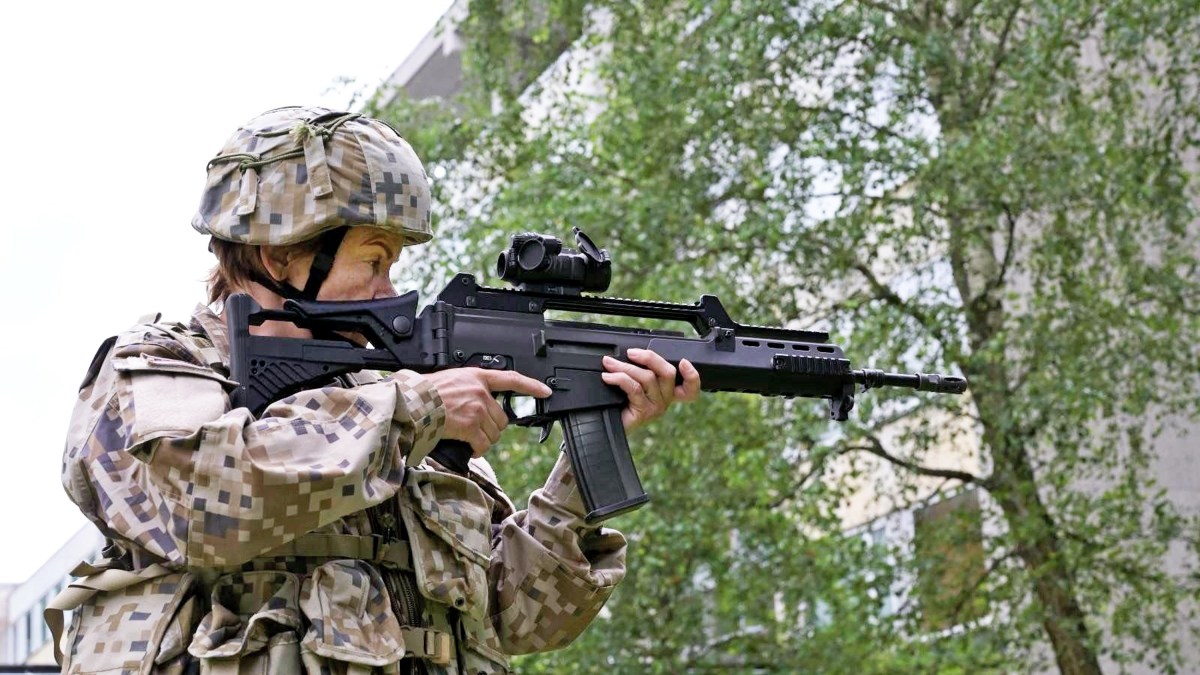Most foreign affairs ministers would probably choose to spend their free time relaxing.
Not Baiba Braze, the 58-year-old former senior Nato official and now foreign secretary of Latvia, who has signed up to her country’s National Guard. On the holidays and her weekends she swaps her formal diplomatic attire for combat fatigues and becomes a private soldier, training among ordinary Latvians.
She knows how to hit a target with a G36 semi-automatic rifle and has completed an intensive ten-day survival course in the forest. Should her country go to war with Russia, she is prepared to defend it, she said on a visit to the UK.
Braze visiting wounded Ukrainian soldiers last year in a medical facility in Odesa, Ukraine
EDUARD KRYZHANIVSKYI/MINISTRY OF FOREIGN AFFAIRS OF UKRAINE/GLOBAL IMAGES UKRAINE/GETTY IMAGES
“When I swore to defend my country, I took that oath very seriously. So if it comes to it, there is no doubt that I will do it. Our task is to make sure that it never comes to it,” she said.
European nations agreed on a huge rearmament plan last week to boost defence spending as the decision by America to pause intelligence sharing and military aid for Ukraine focuses minds.
President Trump has also suggested that the US would not defend Nato countries who do not pay enough for defence. Braze remained resolute that Nato remained a “credible deterrent” to Russia. She thought that the alliance needed to increase its spending target — 2 per cent of GDP at present — to 3.5 per cent. Trump has said he would settle for similar, even though he would prefer allies to hit 5 per cent, a target not even the US reaches. Latvia will spend close to 4 per cent of GDP next year on defence and 5 per cent by 2028.
“Making sure the transatlantic bond is strong is paramount,” she said, adding that Russia and China wanted to weaken the US. “We have to stick together; our adversaries are trying to drive us apart.” Braze, who was assistant secretary general for public diplomacy at Nato until 2023, is sceptical of talk of a peace agreement between Russia and Ukraine.
“There is no practical evidence to suggest that Russia is moving towards peace. The president, or as we call him, the Butcher in the Kremlin, Putin, has said quite the opposite,” she said.
“All instruments of the Russian state are geared towards war. Russia’s politics is war. They will continue the aggression because they have not achieved their goal of conquering Ukraine. The path to peace is actually pretty straightforward: Russia needs to stop bombing and attacking Ukraine.”
In Latvia, which borders Russia, the National Guard is a voluntary public organisation. More Latvians wanted to join the Guard and the reserve forces than there were places, she said. Braze joined because it was “important to understand what it is like in practice” and, at a tactical level, see what was happening to bolster defences.
For now she did not think there was a direct military threat from Russia, but said Moscow was carrying out sub-conventional tactics, such as cyber-disinformation campaigns. “We have to be very conscious that anyone who is of any importance … can be a target for the aggressor,” she said.

